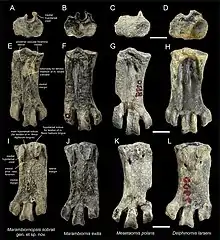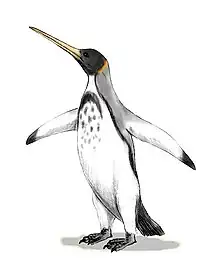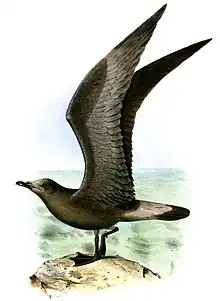| Marambiornopsis | |
|---|---|
 | |
| Holotype fossils | |
| Scientific classification | |
| Domain: | Eukaryota |
| Kingdom: | Animalia |
| Phylum: | Chordata |
| Class: | Aves |
| Order: | Sphenisciformes |
| Family: | Spheniscidae |
| Genus: | †Marambiornopsis |
| Species: | †M. sobrali |
| Binomial name | |
| †Marambiornopsis sobrali Jadwiszczak et al., 2021 | |
Marambiornopsis is an extinct genus of Eocene penguin known from the Submeseta Formation in Antarctica. It contains one species, M. sobrali.[1]
Discovery
The fossils were found during two joined Argentine and Swedish expeditions between February 2011 to February 2012 to the Submeseta Formation, which were later stored in the fossil collections by the staff of the Swedish Museum of Natural History in Stockholm.[1]
Etymology
The genus Marambiornopsis is named after another already-existing genus Marambiornis, combined with the Greek word ópsis, which in this case was used for "appearance". The specific names was in honor of Argentine geologist and Navy Sub-Lieutenant José María Sobral, who also found the first antarctic penguin fossils.[1]
References
- 1 2 3 Jadwiszczak, Piotr; Reguero, Marcelo; Mörs, Thomas (2021-07-03). "A new small-sized penguin from the late Eocene of Seymour Island with additional material of Mesetaornis polaris". GFF. 143 (2–3): 283–291. doi:10.1080/11035897.2021.1900385. ISSN 1103-5897. S2CID 237679229.
This article is issued from Wikipedia. The text is licensed under Creative Commons - Attribution - Sharealike. Additional terms may apply for the media files.

